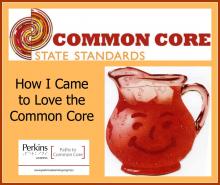
If you’ve followed my blog long, you know that each Tuesday I feature a file of some sort that’s from the CC past. A few months ago, a devoted follower requested I supply documents from the ‘dark period’ for CC. What she shared was, the overabundance of proof that’s been uncovered from before the Core appears to be plentiful. From just after it was rolled out, not so much. So, today’s article features a video from 2013. The featured speaker is Dr. P. David Pearson. If you don’t know the Doctor, here’s a few key items you might like to know.
1) He teaches at Berkeley University
2) He’s quite revered in Language Arts
3) He works with teachers to implement CCSS
4) His featured page on the Berkely website has a typographical error (sorry, I find that rather ironic)
For the above items, see: http://gse.berkeley.edu/people/p-david-pearson
Further exposing his love for CCSS? Read this excerpt, ” Pearson shares the underlying research that informed the Standards and highlights the research evidence of follow-up documents such as the Publisher’s Criteria (produced by CCSS writers). Pearson then describes actions educators can take in keeping policies and practices grounded in the Standards themselves and not in supplementary recommendations that did not go through the rigorous review of the Standards themselves.” Where did I find this? See: http://www.devstu.org/workshop/a-conversation-with-p-david-pearson-phd
The Videos:
Dr. Pearson has been featured on several YouTube videos discussing the virtues of CCSS. The video I’m including has the lady introducing Dr. Pearson as a long revered literacy comprehension scholar. He also was one of the members of the CCSS Validation Committee. You know, the same one Dr. James Milgram and Dr. Sandra Stosky refused to sign off on the Standards, as they failed miserably. So why, would this honored professor not only validate the CC, but help promote them? Text Project was the organization which asked Dr. Pearson to lead the below presentation; the presentation was aired in 2013. More about Text Project in a bit.
[youtube https://www.youtube.com/watch?v=LiReq1WP39s&w=560&h=315]
Did you notice Dr. Pearson’s reasons for potential in ELA via CCSS? Did you catch how he described the Standards? Did you hear that he worked with the Noyce Foundation on research? What about those ‘defensible positions’ he spoke of regarding CCSS in English? What about how he felt in the area of assessments for SBAC and PARCC where CC English is concerned? Before the 5 minute mark, Dr. Pearson tells you exactly how he was ‘sold’ on CC. That nebulous ‘they’ were the ones who presented the materials for CCSS to the validation committee. Want to guess ‘they’ was? (sorry, that was a rhetorical question)
By 6:44, Dr. Pearson shares all hasn’t gone well in CCSS. (What an understatement). Listen for his 5 assumptions. Comprehension and leveled reading are the 2 he highlights in the above presentation. The other 3 are in his book all about CC. “Quality Reading instruction in the Age of Common Core” (see: http://www.reading.org/General/Publications/Books/bk496.aspx )
To access the slides Dr. Pearson had on his 2013 Text Project video (and you’ll love the visual for the Rand Model), PDPearson-webinar-Research-and-the-Common-Core
To access the ScienceLiteracy website address at the bottom of some of the slides in Dr. Pearson’s presentation, http://www.scienceandliteracy.org/, Dr. Pearson serves on the team for SL. It’s also a bit interesting that the home screen says “Next Generation” curriculum. If you’re interested in who helps write and develop or to meet the other members, see: http://www.scienceandliteracy.org/about/meetteam (*Note: I have no proof that this is tied to Gates Foundation funding, but GF did grant Berkely University over 2 million dollars back in 2009 for developing science/literacy formative assessments. See: http://www.gatesfoundation.org/How-We-Work/Quick-Links/Grants-Database/Grants/2009/11/OPPCR060)
Text Project:
Speaking of romancing CCSS, this group really goes all out. Here’s their collection of CC Presentations which cover not only teachers but the school leaders and/or legislators. See: http://www.textproject.org/library/professional-development/guides/
Dr. Pearson is a board member for TP as well as the Vice President of Scholastic, Inc. (Scholastic is a well known CCSS supporter/aligner/profit maker). See their bios and the others they work with, http://www.textproject.org/about/textproject-board-members/
(*Note: one of TP’s partners is a lady who not only serves TP but the SBAC as well. As in the Smarter Balanced Assessement Consortium. See: http://www.textproject.org/about/textproject-s-partners-in-research-and-practice/ )
Noyce Foundation:
I was able to find on the ScienceLiteracy website a 2008 study the company completed for the Noyce Foundation. See: http://scienceandliteracy.org/sites/scienceandliteracy.org/files/biblio/cervettibravoduong_etal_2008_pdf_10364.pdf
So how does Noyce love the CCSS? Let’s count the ways. Here’s one resource called “Inside Mathematics” (see: http://www.insidemathematics.org/ ) Here are at least 3 others, when you click on the first website, know that there are more in-depth links available. See: http://www.insidemathematics.org/common-core-resources)
To access Noyce’s website: http://www.noycefdn.org/ Be sure to look at their “New Initiatives” and “Previous Initiatives”, note that they’re big into STEM, partner with the Carnegie Foundation, and more. See: http://www.noycefdn.org/newinitiatives.php (*Note: be sure to look at their “Human Capital” pages/efforts as well).
Closing:
To say there’s love and romance in the supportive side of CCSS, it appears to be plentiful. If you’d like to see more of Dr. Pearson’s supportive CCSS videos, just insert his name in the YouTube search bar and notice all the different presentations he’s done.
Two more files for you: Here’s the pdf featuring not only Dr. Pearson, but mentions the copyright owners for the CCSS. Pearson_Research_Foundations_Common_Core_State_Standards_in_ELA
Here’s the one Dr. Pearson and the others on the Committee submitted from June 2010. CommonCoreReport_6.10


2 thoughts on “FTF: Romancing the CCSS”